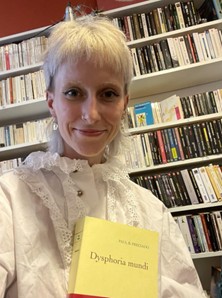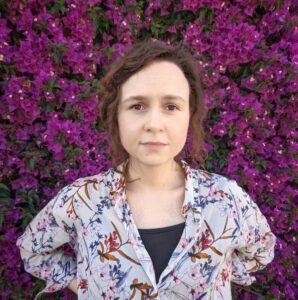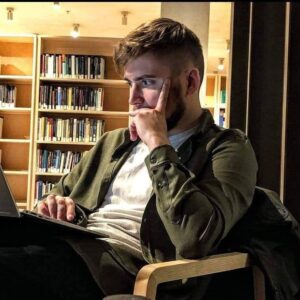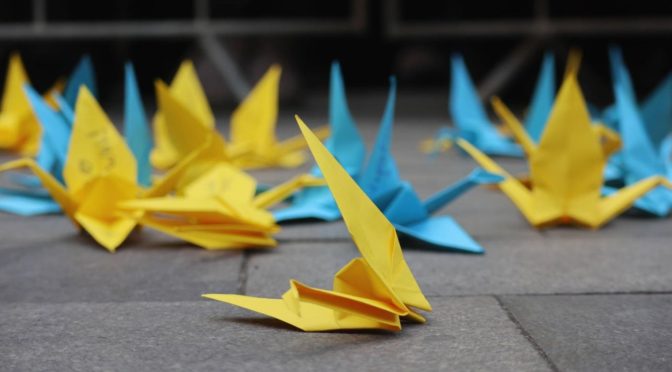« Le genre du métabolisme : constituer des corps sexués à l’intersection des hormones sexuelles et métaboliques »
Axe de recherche 2 – Normes et transgressions
Contact : sabina.vassileva@soc.cas.cz
 Sabina Vassileva est doctorante à l’Université Charles de Prague.
Sabina Vassileva est doctorante à l’Université Charles de Prague.
Sa thèse de doctorat, intitulée Le genre du métabolisme : constituer des corps sexués à l’intersection des hormones sexuelles et métaboliques, contribue à l’axe de recherche 2 – Normes et transgression.
Mon projet de thèse part de la conviction de plus en plus répandue que la fréquence croissante des maladies métaboliques comme le diabète et l’obésité est l’effet de l‘interaction complexe entre des facteurs bio-sociaux. Parmi ces-derniers figurent l'(épi)génétique, un environnement alimentaire saturé d’aliments ultra-transformés, la précarité socio-économique, la détresse psychosociale, outre, comme je le soutiens, des normes, rôles et relations de genre, parmi lesquels le travail reproductif. Je suis particulièrement intéressée par la manière dont les organismes connaissant des fluctuations hormonales sont soumis à des risques accrus de complications métaboliques en raison des « intra-actions“ entre la baisse des taux d’œstrogène et de testostérone, le métabolisme du glucose, la résistance et la sensibilité à l’insuline, les changements du microbiome et les normes genrées du soin. Ces dynamiques demeurent sous-explorées car la recherche biomédicale, dans la conception de ces travaux et pour les essais cliniques, a par le passé privilégié les corps stabilisés (masculins).
Dans ma thèse, j’explore comment les relations biosociales genrées influencent la santé métabolique et les diagnostics tels ceux du diabète et de l’obésité. J’examine comment le genre se manifeste dans la santé métabolique selon trois axes : les pratiques de soin personnelle, le soin clinique et la recherche biomédicale. Mon attention se porte sur les « intra-actions » hormonales entre hormones métaboliques et stéroïdes sexuels. Je me base sur le cadre matériel et sémiotique fourni par Karen Barad et sur l’anthropologie critique féministe des hormones qui a mis en évidence que les hormones ne sont pas seulement porteuses d’imaginaires genrés mais fonctionnent aussi comme des outils technoscientifiques de régulation sexuelle et de gouvernance corporelle. Tandis que les hormones sexuelles telles que l’œstrogène et la testostérone sont souvent étudiées de manière isolée, leurs « intra-actions » avec les hormones métaboliques comme l’insuline ou les peptides de type glucagon restent largement marginales dans la recherche sociologique. Pour combler cette lacune, mon travail combine l’anthropologie féministe des hormones avec la notion de métabolisme post-industriel qui me permet de retracer les constitutions mutuelles du genre et du métabolisme.
Sur le plan méthodologique, mon doctorat adopte une approche mixte. Je combine l’ethnographie qualitative (entretiens semi-structurés et observation des participants)— en explorant les expériences corporelles et les pratiques quotidiennes du « faire métabolisme » et du « faire genre »— avec une analyse critique du discours de la recherche biomédicale sur le métabolisme. Mes partenaires ethnographiques incluent des personnes diabétiques ou obèses qui suivent des traitements hormonaux synthétiques : personnes en période de ménopause ou andropause, ou suivant un traitement hormonal pour affirmer leur identité sexuelle. Ces transitions corporelles sont des situations critiques où la régulation genrée et métabolique est négociée. Par cette recherche, j’enquête sur la manière dont les normes métaboliques genrées sont non seulement répétées de manière discursive, mais aussi matériellement métabolisées, s’intégrant dans la conception des technologies métaboliques et des médicaments utilisés au cours des soins. Dans ce cadre, j’utilise des outils d’ethnographie visuelle comme la cartographie hormonale.
En retraçant comment le genre est matériellement métabolisé dans les corps, les pratiques de soin et la connaissance biomédicale, mon projet offre une nouvelle réflexion féministe du métabolisme comme un processus profondément genré et politiquement régulé. En se concentrant sur les „intra-actions“ hormonales, le projet met en lumière les processus corporels fluides et dynamiques et donne la parole aux corps qui sont marginalisés par la recherche biomédicale sur le métabolisme, et dont l’influence réciproque sur les incarnations sexuelles et sur la vie prise dans des relations sociales genrées n’est pas suffisamment prise en compte.
CV
Formation
- de 2024 à aujourd’hui : Doctorat de sociologie, Université Charles, Prague
- 2021-2024: Master d’anthropologie, Université Charles, Prague
- 2017-2021: Licence de philosophie, , Université Charles, Prague
Participation dans des projets de recherche
- Depuis 2024 : « Technocultures des métabolismes étendus », [GA24-12497S], projet basé à l’Académie tchèque des sciences.
- Depuis 2025 : « Strategie AV21: Umělá inteligence pro vědu a společnost, Využití AI při managementu diabetu 1. typu », projet basé à l’Académie tchèque des sciences.
- Depuis 2025 : « Les travailleurs de plateformes sur le marché du travail tchèque », projet basé à l’Académie Tchèque des Sciences.
Contribution à des conférences (sélection)
- Juin 2025 : « Looped in within algorithms: A biosocial case study of a diabetic living with artificial pancreas », article présenté durant la Nordic STS Conference, Stockholm, Suède
- Juin 2025 : « Unwriting design injustice: hormonal-algorithmic tinkering with open-source diabetes care technology », article présenté à la SIEF Conference, Aberdeen, Royaume-Uni
- Mai 2025 : « Attending to risky attachments: a study of a DIY loop for diabetes care, paper presented at an academic workshop “STS concepts for the life as aftermath », Munich, Allemagne
- Mars 2025 : « Queer metabolism: de/stabilizations of sex and gender binaries in biomedical research on gender affirming care and metabolism », article présenté à la STS HUB Conference, Berlin, Allemagne
- Novembre 2024 : « Opening the black box of algorithms », conférencière invitée dans le cadre d’un cours de premier cycle,
« Společnost, technologie, tělenost », Faculté des Humanités, Université Charles, Prague
- Juillet 2024 : « Digital interfaces, real inequalities: exploring algorhitmic opacity in the platformised Czech delivery sector », article presenté à la EASA conference, Barcelone, Espagne
- Juillet 2024 : « Chrononormativita z perspektivy genderu a politiky těla », conférencière invitée au symposium de Woods,
« Time at the tips of conifers”, monts Orlické, République tchèque
- Juin 2024 : « More than Numbers: Health, Digitalization, and Bioethnography », article présenté au 15th MAYS Annual Meeting, Bologne, Italie.
Publications récentes
- Borisova V., Vassileva S. 2025. „Caring for more-than-human metabolic health: Self-tracking technologies as tools of calculation and communication in obesity and type 1 diabetes care“. Archivio antropologico mediterraneo. 27 (1). http://journals.openedition.org/aam/10112
- Canovas O, Conan L, Gille P, Martinez A, Miranda CK, Palmea K, Roubi T, Suarez M, Vassileva S & Aline Wiame, 2024. « La nature en guerre contre la vie. Une expérimentation d’écriture cyborg entre Guattari et Haraway », Sextant, 41. http://journals.openedition.org/sextant/11409
 I am a Ph.D. candidate in International Relations at Central European University and a DOC-Fellow at the Austrian Academy of Sciences. My research focuses on international election observers in the post-Cold War era. Specifically, I examine practices of contestation facing observation missions sent out by regional organizations. As a key pillar of democracy promotion and liberal international ordering, election observation provides an entry point for understanding contemporary endogenous and exogenous challenges to liberal international ordering.
I am a Ph.D. candidate in International Relations at Central European University and a DOC-Fellow at the Austrian Academy of Sciences. My research focuses on international election observers in the post-Cold War era. Specifically, I examine practices of contestation facing observation missions sent out by regional organizations. As a key pillar of democracy promotion and liberal international ordering, election observation provides an entry point for understanding contemporary endogenous and exogenous challenges to liberal international ordering.



